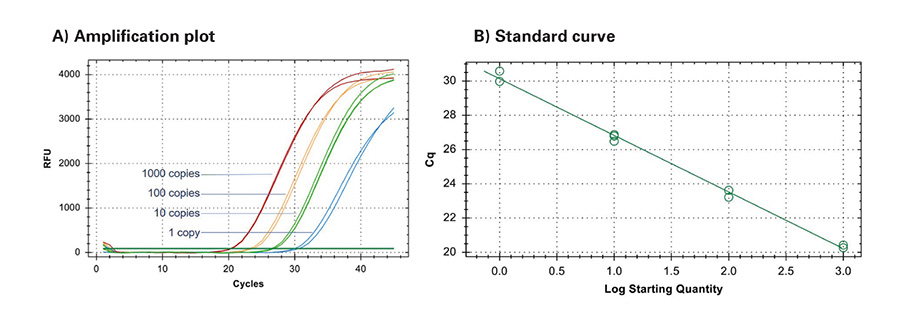可风干™ Direct DNA qPCR Plant Master Mix
可风干™ Direct DNA qPCR Plant is a glycerol-free mix that contain optimized excipients compatible with air and oven drying. It has been designed for the development of qPCR assays for direct detection of plant DNA from crude lysate without extraction.
Can also be used wet and/or with purified nucleic acid.
Detection down to a single copy of Rice ATPe in tomato lysate with high reaction efficiency

可风干™ Direct DNA qPCR Plant Mix was air dried with rice ATPe primers and probe. The dried material was reconstituted in 40% tomato leaf alkaline lysate containing 1,000 copies (brown), 100 copies (amber), 10 copies (green) and 1 copy (blue) genome equivalents per reaction of Rice gDNA.
The results illustrate the sensitivity of the Air-Dryable™ Direct DNA qPCR Plant Mix to (A) detection down to 1 copy of Rice ATPe in tomato lysate with (B) 100% reaction efficiency.
Air-Dryable Direct DNA qPCR Plant, 4x, MDX116
无需提取,与 25% 植物裂解液(SDS、NaOH)兼容。非常适合现场 qPCR 检测的多路复用和快速循环条件。用于基因分型、转基因或病原检测。
文档与资源
迈迪安生命科学部门的可风干植物直扩预混液最近被SeedWorld评为2021年最具创新十大产品之一。™

Description
The introduction of genetically modified organisms (GMO) in the last 20 or so years and the demand for more precise and reliable techniques to detect foreign (transgenic or pathogenic) DNA in edible plants have been the driving force for the introduction of qPCR techniques in plant research. Direct amplification of crudely lysed plant DNA samples is a fast and convenient technique that avoids the need for laborious, time-consuming, and expensive nucleic acid extractions prior to qPCR. Air-Dryable™ Direct qPCR Plant is the first commercially available mix designed for developing ambient-temperature stable assays for the direct quantitation of DNA from plants. It combines the benefits of inhibitor tolerance with air-drying to create highly sensitive and cost-effective plant assays.
Specifications
| Description | Glycerol-free qPCR and RT-qPCR mix containing Taq polymerase, reverse transcriptase, reaction buffer, dNTPs, MgCl2 and air-dry compatible excipients, developed to tolerate the effects of the inhibitors present in plant lysate. |
| Concentration | 4x |
| Appearance | Clear, colorless solution |
| Hot Start | Antibody mediated |
| Application | Probe-based, real-time PCR, two-step RT-qPCR, one-step RT-qPCR |
| Sample type | cDNA, crude or purified RNA and/or DNA from plant tissue |
| Presentation | 1 vial |
| Storage | -20 °C |
| Mix stability | See outer label |
| Assay stability | Up to 24 months at ambient temperature following air-drying |
| Consistency | ± 0.5 Ct variance between test and reference sample |
| DNA Contamination | None detected in PCR amplification with traces overlay with the negative control on E. coli and mouse genomic DNA specific targets. |
| DNase/RNase Contamination | No detectable degradation |
产品资料
相关产品
Air-Dryable™ Direct DNA qPCR Blood
FAQs: qPCR Plant Test
Plant tissue can contain humic acids, pectin, polyphenols, complex polysaccharides, tannins and xylan
In order to obtain best results for plant DNA testing, it is important to use a very small amount of starting materials. The recommended size is 1.2 mm in diameter single leaf punch (0.1 mg).
冻干后的预混液在正确封存的情况下可在常温下稳定保持2年。
That will depend on the plant tissue, for soft leaf samples a direct heat lysis can be applied, a single leaf punch (leaf disc of ø1,2 mm or approximately 0.1 mg) is heated at 95 °C for 5 min in 20 µL water. For tougher tissue a SDS lysis (A single leaf punch is heated at 95 °C for 5 min in 26 µL SDS Lysis Buffer (0.1% SDS)) or alkaline lysis (A single leaf punch was heated at 95 °C for 5 minutes in 20 µL alkaline Lysis Buffer (0.2 M NaOH) and neutralised using 6 µL 2 M Tris-HCl, pH 7.5 (Total lysate volume per leaf punch = 26 µL)) may be necessary.
In the European Union (EU), labelling of any food and feed product containing or consisting of genetically modified organisms (GMOs) is mandatory (Regulation No 1830; Regulation No 1829). In order to comply with existing legislation, analytical methods for GMO quantification and detection must be available. Currently, qPCR is the technique of choice for GMO determination. qPCR can also be used to determine copy number in a transgenic plant (as multiple transgenes tend to be unstable and the plants more difficult to commercialize, qPCR screening for single copies can therefore save time and resources in future generations).
Yes, the Air-Dryable™ Direct DNA qPCR Plant be used as a liquid mix or air/oven dried and stored for up to 24 months without needing to change the reaction conditions and air drying/ambient temperature storage will not affect the sensitivity of the test.
与我们的专业团队联系
想了解更多迈迪安免疫和分子产品信息?欢迎与我们联系
